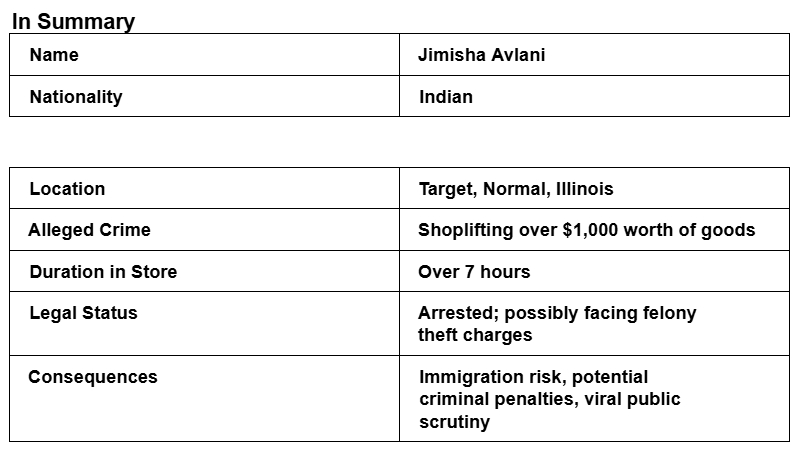
This incident goes beyond petty theft—it exposes how legal ignorance and viral mockery collide in today’s globalized world.
Behind the “Target Auntie” meme lies a serious reality of legal jeopardy and cultural isolation.-Editor’s Note
A bizarre and now-viral incident involving an Indian tourist accused of shoplifting at a Target store in the United States has sparked widespread media coverage, social media commentary, and even diplomatic warnings about the legal consequences of criminal behavior while abroad.
The individual at the center of the controversy has been identified as Jimisha Avlani, a woman visiting the U.S. from India. She allegedly spent more than seven hours inside a Target store in Normal, Illinois, during which time she is accused of systematically removing price tags and concealing hundreds of dollars’ worth of merchandise in her cart before attempting to leave without paying.

A Day at Target Turns into a Legal Crisis
According to multiple reports, store employees became suspicious due to the unusually long duration of Avlani’s stay and the large volume of items in her cart. Security staff closely monitored her behavior, which reportedly included wandering throughout the store for hours, carefully curating items, and tampering with labels.
When she eventually attempted to exit the store without completing a purchase, law enforcement was called. Bodycam footage from the arresting officers, now widely shared online, shows Avlani being confronted and pleading to pay for the items. Police informed her that once she had exited the store without paying, the legal infraction was already complete, and her offer to pay was no longer valid.
The merchandise involved was reportedly worth over $1,000, making this a case of felony retail theft under Illinois law.
Viral Video and Public Reaction
The video of Avlani’s arrest quickly went viral across social media platforms like TikTok, Instagram, and YouTube. In the footage, Avlani appears confused and distressed, repeatedly asking to resolve the situation by paying, while officers explain the legal process. The scene sparked both sympathy and criticism online.
While some users saw it as a cautionary tale about misunderstandings abroad, others mocked the incident, turning it into a trending meme dubbed the “Target Auntie” saga. Exaggerated and fictionalized retellings of the event, suggesting the woman spent hours “stealing slowly” or doing “retail yoga”, gained traction online, blurring the line between humor and misinformation.
Several cultural commentators expressed concern about the meme-ification of a serious legal matter, noting that the jokes relied on stereotypes about Indian women and immigrant behavior in American retail spaces.

Diplomatic Response and Visa Warning
The fallout extended beyond social media. The U.S. Embassy in New Delhi issued a formal visa advisory in response to the viral incident. The statement warned Indian citizens traveling to the United States that violations of U.S. laws, including shoplifting, can result in visa revocation, arrest, deportation, and long-term bans on re-entry.
Officials emphasized that foreign nationals are held to the same standards under U.S. law and urged travelers to understand the local legal environment when visiting.
Legal Consequences and Uncertain Future
If convicted, Avlani may face criminal charges for felony theft, which typically carries penalties including fines, probation, or even jail time, depending on the state’s sentencing guidelines and judicial discretion. In addition, immigration consequences could be severe, particularly if the incident is categorized as a crime of “moral turpitude,” a classification that can impact visa eligibility and green card applications.
Legal experts have pointed out that even an attempt to pay after the fact does not necessarily absolve liability. Once an individual exits a store with unpaid items, the offense is considered complete under most U.S. theft laws.
It remains unclear whether Avlani has retained legal counsel or plans to contest the charges in court. Neither she nor her family has issued a public statement.
Broader Lessons for International Travelers
This case has served as a potent reminder of the importance of legal awareness for tourists traveling internationally. While misunderstandings about pricing, self-checkout processes, or return policies may be common, criminal law in countries like the U.S. can be unforgiving when it comes to theft, even when intent is ambiguous.
Immigration lawyers and travel agencies in India have since issued fresh advisories to their clients, urging caution and cultural sensitivity during trips to the U.S. and other Western countries.

As the viral dust begins to settle, the case of Jimisha Avlani stands as a striking example of how everyday actions, whether malicious, misguided, or misunderstood, can spiral into global attention in the digital age. The story touches on far more than shoplifting: it opens conversations about cultural differences, immigration policy, and the often-blurry lines between humor and humiliation online.
From a legal perspective, the incident is a wake-up call for international travelers: ignorance of the law is not a defense, and even first-time offenses can have life-altering consequences. In the U.S., shoplifting, especially of high-value merchandise, is treated seriously, regardless of a person’s background, intentions, or ability to pay afterward.
From a diplomatic standpoint, it’s a reminder that countries like the U.S. view visa holders not as permanent guests but as conditional visitors. Any criminal charge, even a minor one, can result in visa cancellation and future bans. In Avlani’s case, her visa status could be in jeopardy, especially if the legal process results in a conviction.
But on a deeper cultural level, the case also raises uncomfortable questions about how foreign nationals, particularly older women and people of color, are perceived and treated in public retail spaces. While some online users empathized with Avlani and saw her actions as a result of confusion or cultural mismatch, others were quick to stereotype, mock, or sensationalize. The viral nature of the story, combined with memes exaggerating the timeline and behavior, has in many ways overshadowed the human being at the center of it.
<Esther Hong Student Reporter> LACES ehong0006@mymail.lausd.net







